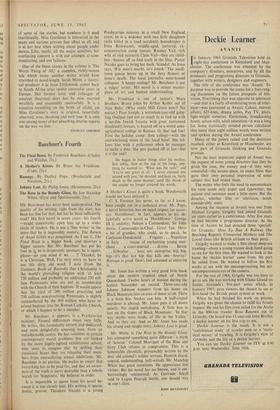Deckie Learner
AVANTI
IN January 1964 Granada Television held an eight-day conference in Knutsford and Man- chester. The conference was attended by the company's directors, executives, and by all the producers and programme directors in Granada, together with writers, designers and engineers.
The title of the conference was 'Avanti.' Its purpose was to provide the arena for a free-rang- ing discussion on the future prospects of tele- vision. Everything that was apposite to television —and that is a fairly all-embracing term of refer- ence—was canvassed at Avanti. Colour, current affairs, 625-lines, drama series, Pay TV, plays, light-weight cameras, Eurovision, broadcasting hours, action stills, adult education—it was a long list. Some statistically minded person calculated that more than eight million words were written and spoken during the Avanti conference.
Many of the points raised and the decisions reached, either at Knutsford or Manchester, are now part of Granada thinking and Granada practice.
Not the least important aspect of Avanti was the request of some young directors that they be given the time, the money and—if they were successful—the screen-space, to make films that gave their own personal impression of some subject that had seized them.
The writer who feels the need to communicate his view needs only paper and typewriter, the painter and musician need a little more. But the director, whether film or television, needs considerably more.
Among the requests at Avanti was one from Michael Grigsby. Grigsby had joined Granada six years earlier as a cameraman. After five years he had become a programme director. At the time of Avanti he had directed three 'specials' for Granada : How To Run A Railway (the Beeching Report), Unmarried Mothers and The Loved Ones (the British attitude to their pets).
Grigsby wanted to make a film about deep-sea trawling—about a young trainee deck-hand going to sea for the first time. He wanted to look at the home the 'deckie learner' came from, the port he sailed from. He wanted to follow his first weeks at sea with the uncompromising but not uncompassionate eye of the camera.
For the rest of 1964, Grigsby was too busy to go to sea. He was working with Elaine Grand on Inside, Granada's five-part series which, in January 1965, gave. viewers the chance to see at first-hand the British penal system at work. When he had finished his work on prisons, Grigsby was given the chance to fulfil his Avanti request. He and his film crew sailed for the Arctic in the 800-ton trawler Ross kenown out of Grimsby. On board was 15-year-old John Bratley, a deckie learner on his first trip to sea.
Deckie Learner is the result. It is not a 'sociological study' of trawler men or a 'statis- tical survey' of trawling. It is Grigsby's view of Grimsby and the life of a deckic learner.
You can see Deckie Learner on ITV at 9.40 p.m. next Wednesday, June 16th.
GRANADA TELEVISION


































 Previous page
Previous page